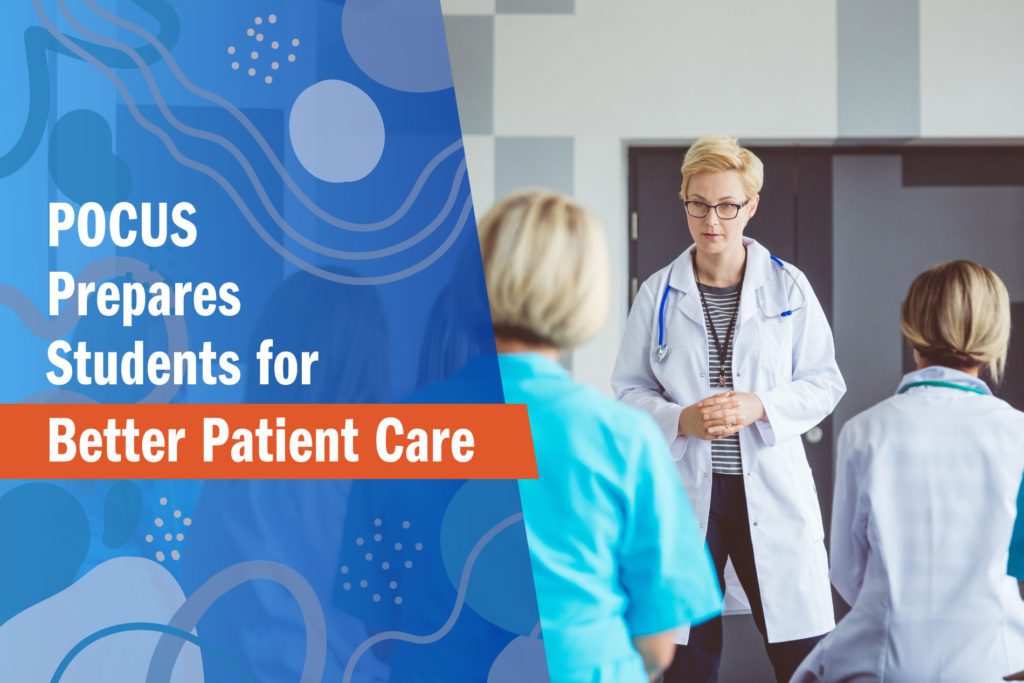The growth of point-of-care ultrasound (POCUS) has practitioners across medicine predicting that it will become as common as the stethoscope.
POCUS is recognized as a groundbreaking tool and trending amidst medical schools and residency programs, working to integrate it into their curriculum.

Introducing the POCUS Curriculum
Dr. Peter Steinmetz led the movement in ensuring McGill University’s medical school students were skilled in POCUS upon graduation. He explains the fuel behind his passion and why he believes in the growth of ultrasound and the importance of introducing medical students to POCUS during their residencies.
“Ultrasound is performed by clinicians worldwide, and is an ideal adjunct to teaching anatomy and conducting physical examinations,” said Dr. Steinmetz. “You need to show how your medical students will effectively learn the skills to use POCUS as a helpful clinical tool.”
The opportunity to learn POCUS before entering the medical field has become more accessible. Many medical students have eagerly taken advantage of the opportunity and found the experience to be highly beneficial.
Benefits of Students Learning POCUS
In his article, The Next Generation Medical Student: Focus on POCUS, Dr. Jonathan Brewer addresses four main benefits of integrating ultrasound into the first-year medical school curriculum.
- Medical students can learn a technique that augments their anatomical knowledge
- They can contribute meaningfully to better patient flow
- It decreases costs
- Students can assist with patient management
Along with the overarching technical and hands-on benefits students receive from learning POCUS while in school, studies have shown students to benefit on individual levels as well.
A study published in the Medical School Monitor found that after taking a one day course of POCUS training incorporated in their anesthesia curriculum, final-year medical students experienced performance improvement in their post-training test scores and higher confidence levels.
By integrating POCUS into its curriculum, medical programs encourage participation, providing an opportunity for engagement that offers a newfound sense of purpose for their students.
In his article, Dr. Brewer asserts that offering more ultrasound curriculum will allow students to play more active roles in the treatment process. He states that it will also enable “them to combat personal burnout while changing the landscape, and cost, of care.”
POCUS and Medical Students Testimonies
Students exposed to POCUS first hand during medical school have spoken to how they feel they’ve profited.
The New York Medical College published an article with testimonies from students who participated in their new training program, Introduction to Point-of-Care Ultrasound conducted for 12 second-year medical students participating in the School of Medicine (SOM) summer fellowship program in emergency medicine.
“It not only was really interesting and helpful, but it was also quite relevant since I showed up to the emergency room at Metropolitan Hospital the next day and was asked to help with a FAST exam and examine a patient’s gallbladder with the ultrasound,” said Juliet Jacobson, SOM Class of 2022.
Jeanette Freeman, SOM Class of 2022, feels like they have “an edge” because of the ultrasound knowledge and experience they received.
The Medical Field of the Future
Students are looking to attend medical schools and residency programs that will prepare them best in the management and execution of patient care. A part of this expectation lies in the trust that students will have access to the best and most relevant curriculum.
Medical schools, programs, and students alike have been learning about the growth of POCUS. By engaging in POCUS study and training in school, medical students experience benefits that allow them to be better healthcare providers.
Ultimately, better providers. Better care.
Are you a current medical student or resident? Learn more about how you can begin or expand your POCUS journey today.
Ready to get started on your POCUS journey? Check out our many certificates and certifications here.
Looking for additional inspiration? Sign up for our POCUS Post™ newsletter to receive monthly tips and ideas.





















